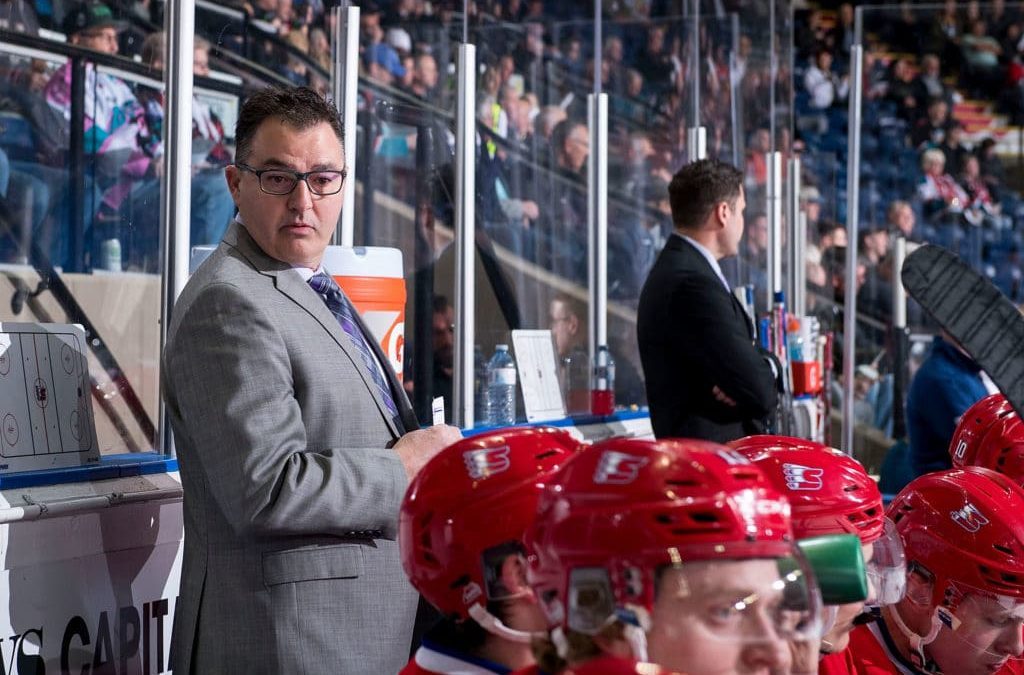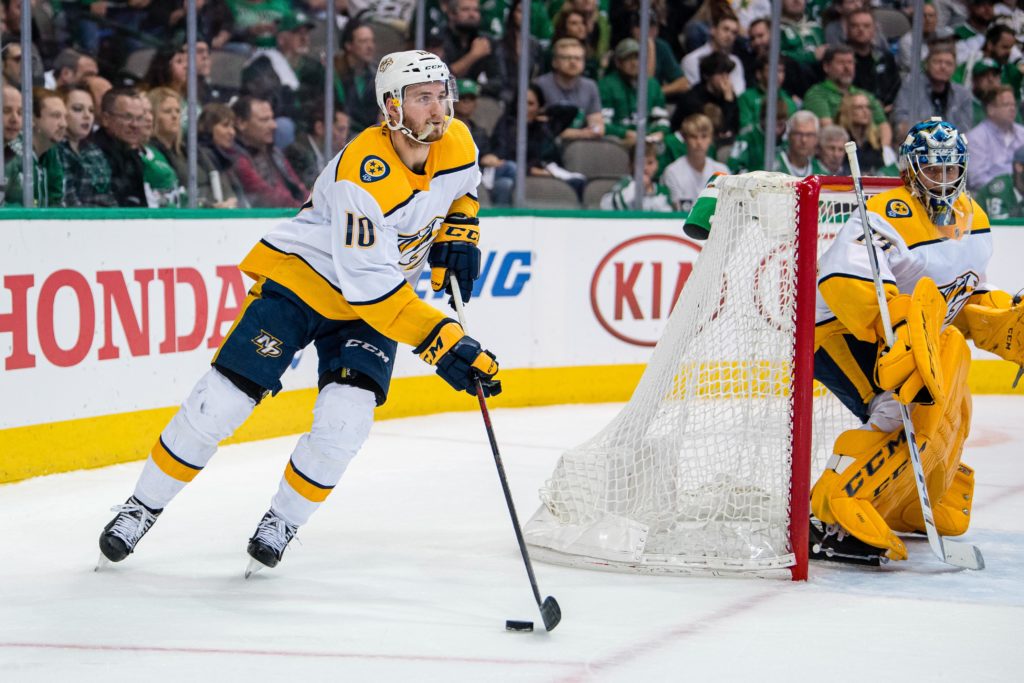Q&A: Dan Lambert hopes to return the Predators’ power play to respectability www.nhlcoaches.com

At the end of the season, Peter Laviolette bared his soul as he explained how the Predators tried everything to fix their dysfunctional, league-worst power play. Nothing worked. Only six teams in the salary-cap era (2005-present) have finished a season with a success rate lower than the Predators’ 12.9 percent.
In an attempt to tackle the problem and avoid the same fate next season, the Predators added to their staff by hiring Dan Lambert, most recently the head coach of the Western Hockey League’s Spokane Chiefs, as an assistant coach.
Lambert spoke to The Athletic last week, with much of the interview focused on how he intends to return the Predators’ power play to respectability. Some of his responses have been edited for clarity.
In announcing your hire, the Predators highlighted your power-play credentials, including the Chiefs leading the WHL last season at 29.1 percent. Why was the power play so effective?
The personnel is always a key factor when you talk about the power play. We had some concepts in place that we tried to use, and our players really bought into it. It became a focal point for us to make sure that we had a positive effect on every power play. That doesn’t mean you’re going to score on every power play, but certainly, you take pride in the fact that you’re on it, (and) you try to create some sort of momentum for your hockey club.
More specifically, what is your philosophy on how a power play should be run, from breakouts to zone entries to offensive-zone setups?
For us, as far as our breakouts, we made sure that we had some different looks that we wanted to use. When we did use our different looks, we wanted them to be predictable to each other, but not to the opposition. The key for that is the timing, and the options have to be there. Guys have to buy into doing and finishing their own routes and being specific when it comes to their own job. Once in the offensive zone, the offensive instincts have to take over.
One of our units was a 1-3-1, which I guess was our No. 1 unit, and then the other unit was a spread, so I do like to have different looks. That doesn’t mean that’s the way it’s going to be next season, but that’s what we did this year. And then having an aggressive mentality. When I think of Predators hockey, I think of aggressive, I think of relentless and I think that you have to keep that same mindset when it comes to (the) power play. And that’s something that I feel we will need the players to buy (into), and then from there, there’s obviously all kinds of things that you can do. But attack mode is necessary.
What should the strengths of the Predators’ power play be when you look at their personnel?
I think (on) every power play, you need a quarterback. Whether your quarterback is on the half wall or up top, I think you need that. The pieces are there for the Predators, for sure, with the personnel that they have. Obviously, (Roman) Josi and (P.K.) Subban and Ryan Ellis, these guys all have the ability to be that player. I think that’s a great asset that we have. Then you look at (Filip Forsberg and Ryan Johansen), these guys have the ability to run from the half wall, and they have the ability to shoot.
But it’s amazing how things can go sideways, and frustration can set in. I focused mostly on the playoff version of their power plays, and it didn’t look comfortable out there. You could tell that frustration had set in. I think the belief of every individual isimportant. But I do believe the quarterbacks, whichever way you decide you’re going to run it through mostly, is the key ingredient. And that individual or those individuals have to buy into that.
I saw a video of you speaking at a coaching symposium a few years ago. You were sharing a story about how the Kelowna Rockets’ successful power play unexpectedly suffered after trading for Leon Draisaitl and Josh Morrissey. This is the part when I tell you that the video ends before you finish the anecdote, but before it did, you said, “What we had to go back to was the basics.” What did you learn from that particular experience, and how can it help the Predators?
Dan Lambert – Fundamentals of the Power Play
It’s funny. When you think of “power play” and you think of “penalty kill,” just in those words alone, one sounds a lot more desperate than the other. “Play” sounds like guys are going to go out there and try to be cute and try to just pass the puck into the net, for lack of a better word. Then when you talk about “kill,” right away you’re talking about killing. You’re talking about being aggressive. You’re talking about desperation. I think that good players at times fall (into) the trap of, “I just want to stand here, and I want to make the pretty plays.” You talked about the time in Kelowna when we added Leon Draisaitl, I think that’s what crept into our power play until we were able to re-transform them into attacking mode. It took a while.
When I watched the Preds’ power play, it had some of that feel as well. I only focused on the playoff version. Throughout my summer, my job is going to be to go further into the season and everything else. I have to find a way to get five players to buy into having that mode, having that mindset and then working with that.
Based on what you saw of the Predators’ power play during the interview process, how would you diagnose the problems that led to the team’s struggles?
Well, every power play starts with a faceoff. Even when the Preds did win faceoffs, I found that they were under pressure right away. Often, it seemed like guys were rushing to their positions before truly winning the faceoff. I just felt like they were always under pressure. It started that way, and it finished that way. And then their breakouts didn’t seem like they were in sync. I’m not blaming anybody. I’m just giving you the short version of what I saw. At the end of the day, all that does, (when) you don’t have successful breakouts or as soon as you win the faceoff, you’re under pressure, it just creates frustration. It changes momentum for the opposition, which is the (last) thing you want to happen. They’re details of guys just maybe forgetting or losing focus of what truly they need to do as soon as the puck is dropped.
More than most teams in the NHL, the Predators utilize a 3F-2D configuration on the power play, which has become less common in recent years. What is your stance on that particular setup versus 4F-1D?
I know the numbers in the NHL seems to favor the four-forwards, one-defense setup. In saying that, I really do believe your personnel will determine that. In Spokane this season, we had one unit that had one defenseman and four forwards. The other unit had two and three. Often, the 4-1 would start every power play, so that when the power play ended, on the other unit, we would already have two defensemen out there. Is that going to happen in Nashville? Time will determine that (as well as) the personnel and what works. Sometimes, it’s not always your five best players that work. For some reason, one player may not work in one situation, and you’ve just got to find ways to put players where they can have success and feel comfortable where they’re at.
Over the past three seasons, the Predators are the worst team in the league in terms of generating “high-danger” attempts on the power play. What can be done to create more scoring chances from those areas of the ice?
I don’t have all the statistics, and I haven’t gone through all of them. I know for us as a team, we’re going to try to focus on just the details of starting to have attack mode and trying to out-compete penalty kills. From what I saw, I can only talk about the playoffs, I didn’t feel that was there. That’s not one individual. That’s everybody collectively. It’s a mindset. You can tell that by then, they had already finished 31st in the regular season, just the frustration, it was almost like you could tell (from) the body language, “Oh my gosh, they look like they don’t even want to be out there.” That can’t be the mindset. It’s going to take some work. It’s going to take some buy-in. It’s going to take some belief. But at the end of the day, when you look at the individual pieces, they’re all there. There’s no reason why we can’t have success.

I’ve grilled you enough about the power play for now.
I have a feeling it’s going to happen a little bit. (Laughs)
You have previous experience coaching Colton Sissons with the Rockets and Dante Fabbro in international competition. What’s impressed you about the steps they’ve made in their respective careers since you last worked with them?
When Colton came to Kelowna, he was 17. We got him out of Junior A. Right away, we could see this young man had leadership potential. The second year, we put him in a tough spot. We named him captain because everybody felt he was the right choice. Being a captain as an 18-year-old in the Western Hockey League is not easy, and it creates a lot of challenges. You’ve got some 20-year-olds that may not be too happy. They might think they should have it. Colton handled that really well, but where we really saw the difference was when he was 19. Then he felt this was his team.
I know he spent time in the minors, and he probably needed to just continue to develop those qualities that he had started in Kelowna. But just the maturity of him as a player, his character, we always felt that if the right team got ahold of him and developed him the right way that he was going to be a very valuable player to some organization in the NHL. I thought the Preds did a fantastic job of developing him and allowing him to grow and not rush him into things. To watch him now, it just seemed as an outsider that he’s a very, very valuable piece to that hockey club.
When I think of Dante Fabbro, when I had him at 16, he was part of our leadership group then. He’s a (high-character) young man and just a good person. For him to be able to do that, to step in the way he did (at the end of the regular season and in the playoffs), it just kind of solidifies the fact of his character because not everybody can handle that. The other thing with Dante is the one player that I’ve always (had) in my mind when I watch him play is, he reminds me of Brent Seabrook, that type of defenseman where he’s just going to make the right play, he’s going to be solid. He’s going to do that for the next 12 to 15 years at a high level. That’s just what I’ve always thought of him, and then you add the fact of coming right out of college and doing what he did. That’s not easy to do. I think it takes a special player, but also a special character. He’s obviously checked off all those boxes.
